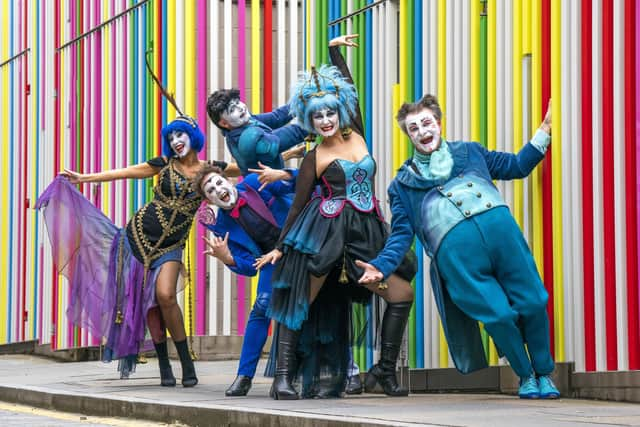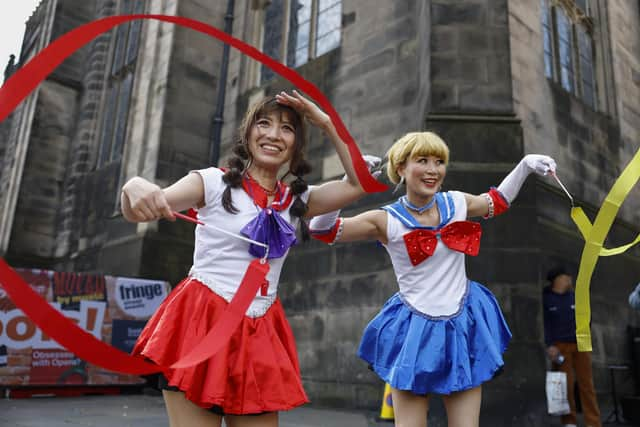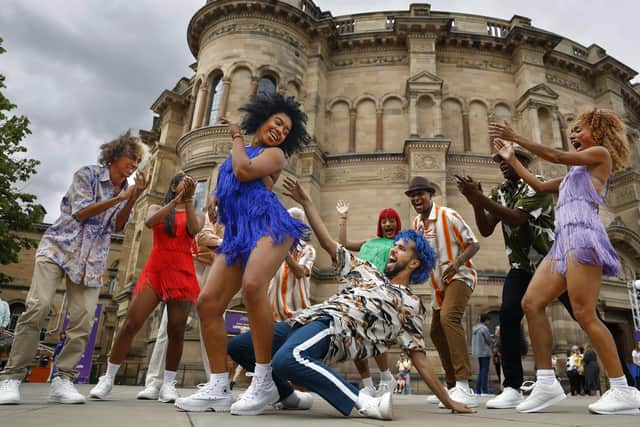Edinburgh Festival Fringe: Scottish Government accused of letting Fringe ‘fall through the cracks’ and diminishing 'festival city' status
Organisers of the Edinburgh Festival Fringe have accused the Scottish Government of letting the event “fall through the cracks” and putting its world-leading status at risk by failing to provide enough funding for the nation’s biggest cultural celebration.
The Fringe Society, which oversees the event, has suggested Edinburgh’s long-held “festival city” status, which dates back to 1947, is now “looking diminished” due to a lack of serious investment in the face of competition from other UK cities.
Advertisement
Hide AdAdvertisement
Hide AdIn a wide-ranging response to the Scottish Budget, it warned government promises of securing an additional £100 million for the cultural sector would not be enough to tackle “sustained disinvestment of many years and historic underfunding”.


A new report from the arts charity, which runs the official festival box office, website, media office and industry events programme, has admitted losing many of its staff over the past two years due to “the enormous demands of delivering with minimum human and financial resource".
It has admitted the “old operating model” of both the festival and the Fringe Society were no longer sustainable in the long term, warning that both faced “insurmountable challenges” due to rising inflation, skills shortages, reduced funding and the cost-of-living crisis.
Led by chief executive Shona McCarthy, the Fringe Society, which does not get any core public funding from the government, has called for £1.5m to be invested annually in the event, which is said to be worth at least £200m for the economy.
It has drawn a contrast between the treatment of the festival and the level of support for the one-off UCI World Cycling Championships event, which was staged across Scotland at the same time as last year’s Fringe. The government is understood to have put at least £44m into the event, but has not confirmed its final funding arrangements.


The Fringe Society report states: “As the largest arts event on the planet, the Fringe helps Edinburgh and Scotland promote itself across the globe, and the economic impact of the Fringe each year outstrips the benefits of one-off major events.
“We urge the government to ensure that when money is available that the choice is made to support long-term, home-grown initiatives that deliver for the nation culturally, socially, economically and reputationally.
Advertisement
Hide AdAdvertisement
Hide Ad“It cannot be right that something as vital as the Fringe can fall through the cracks whilst one-off, bought-in events receive multi-million support packages, with none of the sustained impact.
“Without significant core investment we are at serious risk of losing our leading position. With other cities in the UK and other nations seizing the opportunity and providing significant investment for ambitious cultural projects and events, Edinburgh's festival city status is looking diminished.


“We need to be able to be relevant, ambitious and competitive, and we need to be able to attract local and international talent to work in our sector."
Ms McCarthy said she had “absolutely no idea” whether the promised additional arts funding in Scotland would have any impact on the Fringe.
She added: “We need a specific and bespoke response. The Fringe is a global brand.
"I still find it astounding when I say it out loud that the Fringe is falling through the cracks of all of the existing funding mechanisms.
“We do not receive core support, we suffer from not being a (Creative Scotland) regularly-funded organisation and we suffer from not fitting within the major events portfolio as we are not a mobile or one-off event.
Advertisement
Hide AdAdvertisement
Hide Ad"So we’re not right for Creative Scotland, or EventScotland or Scottish Enterprise, yet we are the biggest performing arts festival in the world, happening every single year in the Scottish capital, including some 900 shows from across Scotland.
“To put our position starkly at the minute, we are going into 2024 with no reserves, carrying a huge deficit and a loan from the Scottish Government that we got to survive Covid, which we had to get because of the historic wrong of being removed by Creative Scotland as a regularly-funded organisation. It’s absolutely crucial that, at the very least, we break even this year.”
Ms McCarthy said it had “pained” the Fringe Society to see the government spending tens of millions of pounds on “one-off, higher cost and lower value” events like the world cycling championships.
She added: “Scotland needs to decide if it wants Edinburgh to retain that ‘festival city’ status.
"Edinburgh’s festivals are not like festivals in other cities. Edinburgh has been an inspirational festival city to Europe and the world.
"I know this because I was on the outside of it looking in with massive envy until I got on the inside of it and realised just how jeopardised it is.
“If we value and want to retain that global reputation there needs to be a new approach.”
Advertisement
Hide AdAdvertisement
Hide AdThe Fringe Society dossier for Holyrood admits that it needed help to put in place “an organisational culture that looks after its people, that is exacting and fulfilling, but does not put unrealistic expectations or workloads that break people”.
It added: “The community of people who make the Fringe happen each year are creative and entrepreneurial.
“The ask is not, therefore, to become a curated festival and to fund the creation and delivery of all work produced at the Fringe. The principle of inclusion and open access and the ambition to be largely self-funded remains.
“But there needs to be investment in the platform and infrastructure that underpins the festival, to offer some underwriting of the risks and costs, which will, in turn, create jobs, improve artist and visitor experience, and allow the focus of those who make the festival to be squarely on the production of their best work for their long-term professional development.
“If the Fringe was supported by £1.5m per year across the festival, that would represent a 133:1 return on investment for a £200m economic impact each year, most of which would be spent on the supply chain of Scottish businesses who provide services to the festival each year.”
Comments
Want to join the conversation? Please or to comment on this article.
